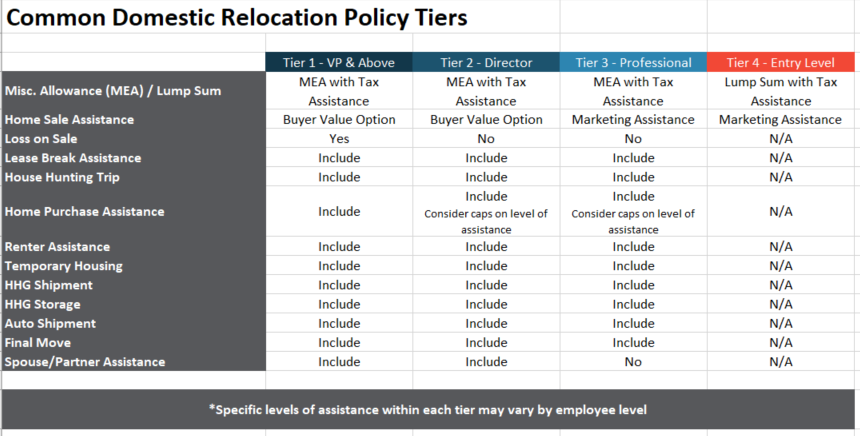Moving Out-of-State for Work? Everything You Need to Know About Relocation Services
There’s little question that today’s job market is becoming more competitive. Many qualified job seekers receive multiple job offers, weighing the pros and cons of each. Employers who can offer the best compensation and benefits typically land the best talent. Typically, many people think of common benefits, such as health coverage, dental insurance, or 401k options. However, a benefit that is often overlooked when extending an offer to out-of-state job seekers is relocation assistance.
When sending out offer letters to job candidates, companies should consider including relocation services. Relocation benefits may be the deciding factor for your preferred candidate as moving their family out-of-state is not cheap. With the right relocation package available to them, the employee can feel at ease knowing the company has their best interests in mind. HR departments that help relieve the employee of the burden of moving by including relocation services in the hiring process note increased job acceptance rates and employees that arrive at their destination ready to work.
Oftentimes, companies will work with a relocation management company (RMC) to develop and manage their relocation programs while delivering a wide range of relocation services. From the packing and shipping household goods to the delivery of visa or real estate assistance, there is a lot that goes into family moves. A reliable RMC can help companies have competitive relocation packages ready and will coach the moving employee and their family through the entire process.
Additionally, for companies that provide their employees a lump-sum relocation package (in lieu of a comprehensive relocation policy), having an RMC on your side can be a great benefit. The relocation company can provide value-added assistance to the employee by helping them manage their lump sum budget, source vetted vendors, such as household goods movers, and provide access to technology that will assist the employee with their self-managed relocation.
Advantages of Relocation Services
There are plenty of advantages to leveraging relocation experts when utilizing relocation services in your talent acquisition efforts. The first and foremost benefit is a reduction of stress on your workforce. Moving across town is hard enough to coordinate but managing an out-of-state move while trying to start a new job is even more difficult. Relocation Consultants (Relocation Coaches at GMS) can help with the coordination of the move, allowing the employee to focus on their new job position and the onboarding process.
Cost savings is also another advantage that both the company and the employee will enjoy. For the employee, relocation costs can represent a significant financial burden. Largely, companies that offer relocation benefits include expense management as a core portion of their relocation policies, essentially providing financial assistance for a range of approved benefits related to the move.
Additionally, companies themselves can realize savings on the cost of relocation services through the usage of an RMC with a vetted and competitive network of providers. The usage of a multiple-bid process allows the RMC to “shop around” to obtain competing quotes of key services, such as household goods transportation. This results in a more cost-efficient program and increased customer satisfaction.
Time management is another huge advantage. RMCs have helped thousands of people move before with established processes and technology, so they are prepared to make it as time efficient as possible. The RMC will perform the coordination of services, such as booking short-term housing, setting dates with movers, and assisting with the sale of the employee’s home.
This time savings is beneficial to a relocating employee as they may only have a few weeks to get to their new destination. By allowing a quality relocation management company to orchestrate the relocation, you can mitigate the risk of delays, which could potentially push back an employee’s start date.
What Is a Relocation Package?
Relocation packages, also known as relocation policies, are benefits and support that companies offer employees who are transferring to a location for a position. These policies cover a range of supporting benefits spanning a wide range of relocation-related services. These may include visa/immigration assistance, real estate/rental assistance, the shipment of the employee’s household goods, global tax services, culture/language training, temporary housing assistance, spouse/partner career support, miscellaneous expense allowances, and more.
There are a variety of different relocation packages that a company may offer an employee, with differing levels of support that are aligned by the employee’s position, their assignment, or other factors, as determined by the employer. As every company has differing needs and objectives related to their workforce mobility program, the specific structure and benefits offered in their policies will vary from company to company. However, it is common practice across many industries to utilize a multi-tier program, generally separated by employee level.
What Should a Relocation Package Include?
The most common relocation services will include most of the basic relocation needs including:
Moving services: The transportation of the employee’s household goods is one of the most needed relocation services. Safely packing, shipping, and storing the employee’s household goods is a critical relocation benefit offering.
Short-term housing: Also known as corporate housing or temporary housing is a benefit that typically includes 30, 60, or 90 days in a furnished apartment while the relocating employee finds a full-time home in their new area.
Real estate & rental support: Buying and selling houses can be a confusing process. Most relocation service providers urge companies to include real estate assistance in their packages. Home sale programs allow employees to have options when it comes to selling their current home. Assistance with home finding is also commonly provided, allowing the employee to tour their destination and look at properties that align with their needs. For renters, benefits may include lease break assistance with their current apartment, tours of communities at their destination, and lease negotiation services.
Visa and immigration support: For companies that move employees internationally, assistance with the visa and immigration process is important. With the complex range of laws, visa types, and reporting rules, leveraging your RMC’s immigration experience will ensure your company is compliant with international laws.
Other benefits: Apart from the above, most companies decide to include the following relocation services: pet moving specialists, automotive transportation, destination services, travel assistance, family support programs for spouses and school-aged children, expense management services, and more.
How Much Do Relocation Services Cost?
The cost of relocation services and packages will depend on the policies that the company is willing to offer for new or promoting employees. It can also depend on the specific needs of the employee who is moving. How many family members is the employee relocating with? What size is their home and what support is needed to move their personal items? Does the company feel the need to cover auto transportation? Does the employee have a home to sell or a lease to break? Is the employee receiving a comprehensive benefits package or a streamlined lump sum?
Depending on the answers, the total costs can vary. It is important to have a conversation with your relocation management company regarding program costs, methods of cost control, and when and where to use certain relocation benefits. Robust and detailed reporting should be provided by your RMC to ensure you have complete visibility into your program’s total spend and where that money is being spent.
How to Address Relocation Costs
Relocation packages have a range of what they can and cannot cover. Some of the more common methods used to address relocation expenses include:
Direct Billing: The RMC will source, coordinate, and pay the vendors hired in the relocation process. Invoices are handled and later paid by the employee’s company. This type of expense management can be pricey for the company but ensures the moving employee gets the most bang for their buck.
Expense Reimbursement: This solution is set up to where the employee pays for all relocation expenses upfront, then receives compensation checks from their employer after the move is complete. This type of package can be tricky to handle if the benefit is not written by a professional RMC.
It is also common to see a blend of direct billing (for large-ticket items, such as HHG transportation costs) and expense reimbursements (for smaller relocation expenses that may be covered by a miscellaneous allowance provided by the company).
Lump Sum: A lump sum relocation policy is basically a set amount of money given to the moving employee upfront to handle any moving costs as they see fit. Usually, the most popular type of relocation package due to its ability to provide simple controls over costs and easy budgeting, this method also provides the least amount of support to the employee and exposes them to potential risk.
Core-Flex: Some RMCs can offer core-flex relocation packages, where the relocation policies incorporate a core relocation benefit section, along with a menu of optional benefits. For example, a core relocation benefit may be HHG moving assistance. An optional “flex” benefit might include spouse/partner career transition assistance.
GMS Specializes in Relocation Services
Since 1987, Global Mobility Solutions has assisted companies and employees with all their relocation service needs. From creating relocation policies to coaching employees through the process, our experienced and talented team can assist in any way. We are always available to field your questions, contact us today to get all your corporate relocation or international relocation questions answered.
We're Here to Help! Request a Courtesy Consultation
Are you ready to talk to a Mobility Pro? Learn how GMS can optimize your mobility program, enhance your policies to meet today’s unique challenges, receive an in-depth industry benchmark, or simply ask us a question. Your Mobility Pro will be in touch within 1 business day for a no-pressure, courtesy consultation.











